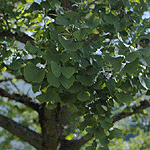|
|
The Eclectic Physician
Medicinal Herb Monographs
Ginkgo
Botanical Name
Ginkgo biloba
|

Ginkgo biloba
|
The information on this page compiled by
Beth Burch N.D.
Index
(click on the keywords)
Introduction
Ginkgo has been cultivated in China for centuries where its medicinal use
dates back to 2800 BC. The traditional Chinese uses of Ginkgo include the
relief of asthma and cough, and to support brain function. Currently, Ginkgo
is widely prescribed in Europe for conditions including brain dysfunction,
peripheral vascular disease and erectile dysfunction, with more than 10
million prescriptions written worldwide in 1989.
[ Back to the Index. ]
Description
-
Ginkgo biloba is the oldest living tree species in the world and is the
only surviving species of the family Ginkgoaceae. A single tree can live
up to 1000 years. Ginkgo is indigenous to China, Japan and Korea, but is
widely planted as an ornamental throughout the US. It grows to a height
of 100 feet or more. The female trees have a pointed pyramidal shape, with
the male trees broader. Ginkgo has a unique leaf in the shape of a fan,
light green in the summer and turning to golden yellow in the fall. The
leaves are the medicinal part used fresh or dry. The seed is fleshy and
round with a foul smell when ripe and contains an edible nut.
[ Back to the Index. ]
Constituents
-
Flavonoids- including quercitin, isorhamnetins, kaempferol, 3’-O-methymyristicins
-
Bioflavonoids- including amentoflavone, bilobetin, 5-methoxybilobetin,
ginkgetin, isoginkgetin
-
Proanthocyanidins
-
Trilactonic diterpenes-including gingolides A, B, and C
-
Tilactonic sesquiterpene- bilabolide
[ Back to the Index. ]
Action/Effects
-
Stabilizes cell membranes
-
Antioxidant
-
Enhances oxygen utilization and uptake of glucose by cells
-
Anticoagulant-Potent inhibitor of platelet activating factor & stimulates
synthesis of prostacyclin
-
Balances vascular tone
[ Back to the Index. ]
Conditions used
for
-
Alzheimer’s disease (1,2,3)
-
Cerebral vascular insufficiency with decline in mental function (4,5)
-
Peripheral vascular disease (6)
-
Vertigo of vascular origin (7)
-
Erectile dysfunction of vascular origin (8)
-
Asthma(9)
-
Antidepressant medication induced sexual dysfunction(10)
-
May be of benefit in angina, tinnitus, migraine and depression.
[ Back to the Index. ]
Dosage
-
Dried extract assayed for flavone glycosides & terpene lactones content-most
commonly available capsules have 24% & 6% respectively and the dose
is 40-80 mg three times a day.
-
Dried leaves-1-3 grams per day prepared as a tea three times a day.
-
It will take 6 weeks to 6 months to reach maximum effects in most conditions.
[ Back to the Index. ]
Side Effects
-
Gastrointestinal upset
-
Headache
-
Allergic reactions
[ Back to the Index. ]
Contraindications
-
Hypersensitivity to Ginkgo
-
Ginkgo supplements should be discontinued at least 2 weeks prior to surgery
or dental extractions to prevent excessive bleeding
[ Back to the Index. ]
Interactions
with medications
-
Should not be used with anticoagulants including warfarin, aspirin, ibuprofen
and other non- steroidal antiinflammatory medications. (11)
-
May counteract the therapeutic effects of corticosteroids. (12)
[ Back to the Index. ]
Use in
pregnancy & lactation
-
Gingko is contraindicated while trying to get pregnant and during pregnancy
(Ginkgo constituents are being studied as a possible contraceptive and
Ginkgo is also a potent blood thinner increasing the possibility of bleeding).
-
No information on the effects of Gingko during lactation, but it should
be avoided during the immediate postpartum period due to its anticoagulant
effects which could cause increased bleeding.
[ Back to the Index. ]
References
1. Oken BS et al, The efficacy of Ginkgo biloba on cognitive
function in Alzheimer disease, Arch Neurol 1998;55(11):1409-15
2. Kanowski S et al, Proof of efficacy of the Ginkgo biloba special
extract EGb761 in outpatients suffering from mild to moderate primary degenerative
dementia of the Alzheimer type or multi-infarct dementia, Pharmacopsychiatr
1996;29:47-56
3. Hofferberth B, The efficacy of EGb761 in patients with senile dementia
of the Alzheimer type, Human Psychopharmacol 1994;9:215-22
4. Rigney U et al, The effects of acute doses of standardized ginkgo
biloba extract on memory and psychomotor performance in volunteers, Phytother
Res 1999;13(5):408-15
5. Curtis-Prior P et al, Therapeutic value of Ginkgo biloba in reducing
symptoms of decline in mental function, J Pharm Pharmacol 1999;51(5):535-41
6. Peters H et al, Demonstration of the efficacy of ginkgo biloba special
extract EGb 761 on intermittent claudication--a placebo-controlled, double-blind
multicenter trial, Vasa 1998;27(2):106-10
7. Cesarani A et al, Ginkgo biloba (EGb 761) in the treatment of equilibrium
disorders, Adv Ther 1998;15(5):291-304
8. Sikora R et al, Ginkgo biloba extract in the therapy of erectile
dysfunction, J Urology 1989; 141:188A
9. Li MH et al, Effects of ginkgo leave concentrated oral liquor in
treating asthma, Chung Kuo Chung Hsi I Chieh Ho Tsa Chih 1997;17(4):216-8
10. Cohen AJ et al, Ginkgo biloba for antidepressant-induced sexual
dysfunction, J Sex Marital Ther 1998;24(2):139-43
11. Kim YS et al, Antiplatelet and antithrombotic effects of a combination
of ticlopidine and ginkgo biloba ext (EGb 761)Thromb Res 1998;91(1):33-8.
[ Back to the Index. ]
* The information presented in this web site is intended to inform and educate.
It is not intended replace a qualified medical practitioner to diagnose or treat medical conditions.
|
|

